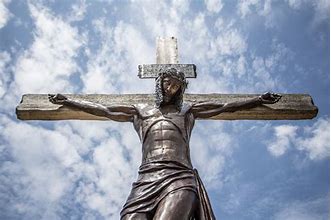“Father, forgive them”–A Radical Idea
We know how the story ends—according to Peter in Acts 2:23, Jesus is brutally murdered by lawless men who were manipulated into this heinous act by the leadership of Israel. Yet, we encounter a strange thing in Luke 23:34: “Jesus said, “Father, forgive them, for they know not what they do.” Jesus utters these words from high up on the cross as He looks down on His tormentors. As they revel in His misery, they look up and see the declaration of Pilate—the representative of Rome: “This is the king of the Jews.” What kind of king forgives such wickedness? What kind of kingdom is this? Is this how kingdoms-in-conflict interact? These are some of the questions that the Gospels answer.
The irony of this moment is that all of history has been leading up to this event, i.e., the murder of God. The death, burial and resurrection of Jesus Christ is the apex of human history, because it shows the lengths that God will go to restore fallen man from his exile in sin. What these wicked men meant for mockery and the removal of Jesus from His throne, God meant for His own glory. Glory? How can such an ignominious death bring anyone glory least of all God? Jesus seemed to think so, for He says in John 17:1 “Father, the hour has come; glorify your Son that the Son may glorify you.”
There is a sense in which Passion Week is the coronation of King Jesus for they hail him as “the son of David” during the triumphal entry, they crown Him, they dress Him in royal robes, they bow the knee to Him and Rome declares Him to be the king of the Jews—and it ends with Jesus being raised up higher than all others on His royal throne the cross. The crowning of a king is the fitting end to that which the four Gospels refer to as the coming of the “kingdom of God.” Jesus Himself says in Luke 4:43 “I must preach the good news of the kingdom of God…for I was sent for this purpose.” Jesus was sent by the Father to begin the kingdom of God on earth. We can safely say that the resurrection of Jesus and His ascension establish said glory, yet the glory-path led through the cross.
Yes, they murdered King Jesus. John foreshadows this in John 1:11 when he says: “He came to His own, and His own people did not receive Him.” Luke 19:11’s parable of the “minas” pictures Jesus as a nobleman who has come to receive a kingdom, yet the people did not want him to rule over them. Verse 27 gives the answer we would expect from the nobleman: “But as for these enemies of mine, who did not want me to reign over them, bring them here and slaughter them before me.” This parable ends differently from “Father, forgive them…” seeing as it looks to the final judgment at Jesus’ return.
However, it is “Father, forgive them” that reverberates down the ages as a clarion call to the level of behavior Jesus expects from His church—we see this from the outset in Acts 7:60 when Stephen, the first martyr, cries out for all to hear: “Lord, do not hold this sin against them.” There is nothing more divine than to forgive others their sin. We are never more like Jesus than when we forgive others their “trespasses against us,” because it always costs us something—at the very least, it is unnatural for us to forgive as Jesus did.
Jesus gives us a pattern in this word from the cross. He has already established His love for the Father in the Garden, saying: “not my will but yours be done.” From the cross, Jesus gives us a demonstration of what He meant in Luke 11:25-28 regarding the two great commandments (love of God and neighbor): “do this, and you will live.” This word of forgiveness to His “neighbors” is a proof of His love for the Father. Keeping these two commandments is at the heart of the Gospel. May the Holy Spirit empower us to love God so much that we can give heartfelt forgiveness to those who spitefully use us. Amen.


